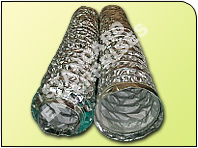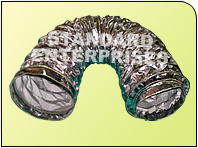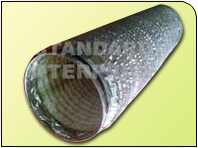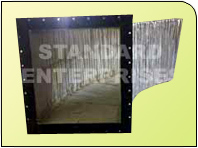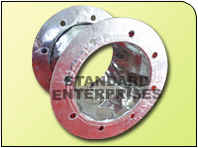High temperature glass / ceramic fabric bellows are used where there is continues high temp. Application i.e. Near furnaces. This materials with stand temp upto 200 0c to 1200 0 c & totally fireproof.
High Temperature Glass Fabric Expansion BellowsHigh temperature glass fabric expansion bellows are flexible connectors designed primarily to absorb vibrations, thermal expansions, or contractions in pipelines, ducts, and various exhaust systems. These bellows are typically constructed from high-quality glass fabric materials that can withstand extreme temperatures, making them suitable for challenging industrial applications.
Features and Benefits of High Temperature Glass Fabric Expansion Bellows:High temperature glass fabric expansion bellows, often referred to simply as "expansion bellows" or "fabric expansion joints," are flexible connectors that are designed to absorb movements and vibrations between sections of ducts, pipes, or other conveying equipment. They are particularly effective in high-temperature environments such as power plants, industrial facilities, and chemical processing plants.
The benefits of using high-temperature glass fabric expansion bellows include:- Thermal Expansion Compensation: They absorb the thermal expansion and contraction that occurs in piping systems when they heat up or cool down, preventing stress and potential damage.
- Vibration Dampening: They can reduce or eliminate vibrations that may be transferred from equipment like turbines, fans, or blowers, thus prolonging the life of the machinery and the conveying system.
- Misalignment Compensation: Bellows can adjust for minor misalignments during installation or those that might occur over time due to settling or other structural changes.
- Noise Reduction: They help in reducing noise transmission in the piping system, thereby providing a quieter operational environment.
- Corrosion Resistance: The glass fabric material is resistant to many corrosive agents, making it suitable for a variety of applications.
- Lightweight and Flexible: Glass fabric expansion bellows are relatively lightweight compared to metal bellows. This can simplify installation and reduce the need for heavy supporting structures.
- Cost-Effective: Compared to metal expansion joints, fabric bellows can be less expensive and offer a longer service life in certain applications, especially where multidirectional movements are involved.
- Customization: They can be designed to fit specific requirements. This includes factors like size, shape, and movement capabilities.
- Low Maintenance: Due to their flexible nature and resilience to high temperatures, they often require minimal maintenance.
- Minimal Reaction Force: Unlike metal bellows, fabric expansion joints impose minimal forces on the adjoining equipment and support structure when they flex.
- Chemical Resistance: Certain fabric materials and designs can offer resistance to specific chemicals, making them suitable for challenging environments.
Ease of Replacement: Fabric expansion joints can be easier to replace than metal ones, particularly in systems where access is restricted.
However, while high-temperature glass fabric expansion bellows offer numerous benefits, they may not be suitable for all applications. It's essential to evaluate the specific requirements of the system and the conditions it will operate under, such as temperature, pressure, and chemical exposure, to ensure the correct choice of expansion joint material and design.
Applications of High Temperature Glass Fabric Expansion Bellows:High Temperature Glass Fabric Expansion Bellows are a specialized type of flexible connector used in various industries. They are designed to absorb and compensate for misalignments, thermal expansion, vibrations, and other movements in piping systems. Made from high-temperature resistant glass fabrics, these bellows offer durability and can withstand adverse conditions.
Here are some common applications of High Temperature Glass Fabric Expansion Bellows:
- Industrial Ducting Systems: They are commonly used in industries that involve high-temperature processes, like steel manufacturing, power generation, and cement production. The bellows help in compensating for the thermal expansion of ducts.
- Power Plants: In power plants, especially ones that use fossil fuels, the exhaust gases can be quite hot. These bellows are used in the exhaust systems to allow for the expansion and movement of ducting due to these high temperatures.
- Chemical Processing Plants: In plants where chemicals are processed at high temperatures, these bellows can be used in piping systems to handle the expansion and contraction that occurs due to temperature fluctuations.
- Automotive Industry: They can be used in the exhaust systems of vehicles, especially high-performance vehicles, to manage the high-temperature exhaust gases and prevent any damage to the surrounding components.
- Metal Processing: In industries like steel or aluminum production, where furnaces produce very high temperatures, the piping systems can utilize these bellows to handle temperature-induced movements.
- Aerospace: These bellows might be used in test facilities or ground support equipment where high-temperature gases or fluids need to be channeled.
- Ovens and Furnaces: In commercial or industrial ovens and furnaces, these bellows can be used in the ventilation or exhaust systems to handle the hot air or gases.
- Gas Turbine Systems: The exhaust systems of gas turbines, which can be extremely hot, may utilize these bellows to allow for thermal expansion.
- HVAC Systems: In large commercial buildings or industries, where heating systems operate at high temperatures, these bellows can be part of the HVAC ducting to manage the thermal expansion.
- Research & Development: For institutions and labs working on high-temperature applications or testing, these bellows can be a critical component in their experimental setups.
In addition to their ability to handle high temperatures, these bellows also provide other benefits like reduced noise transmission and vibration isolation, making them a valuable component in many industrial applications. It's important to choose the right type of bellow depending on the specific requirements of the application, such as temperature range, pressure, and the chemicals or gases involved.
- Types of Movements Handled:
- Axial Movement: Expansion and contraction along the length of the pipeline.
- Lateral Movement: Side-to-side or shearing movement.
- Angular Movement: Deflection from the original angle, mostly observed in pipeline bends.
High-temperature glass fabric expansion bellows (often just referred to as "expansion bellows") are components used to absorb the dimensional changes in pipelines, ducts, or vessels due to temperature variations. They are made of special high-temperature-resistant fabrics and can handle significant mechanical stresses. Proper maintenance is key to ensuring the longevity and effectiveness of these expansion bellows.
Here are some maintenance tips for high-temperature glass fabric expansion bellows:- Regular Inspection: Periodically check the expansion bellows for any visible signs of wear, tear, or damage. This includes looking for cracks, abrasions, loose flange bolts, or any distortion in shape.
- Avoid Over-Expansion: Ensure the system does not exceed the design parameters of the bellows, such as temperature and pressure. Over-expansion or over-contraction can reduce the lifespan of the component.
- Check Installation: Ensure that the bellows have been properly installed. Misalignment, incorrect anchoring, or improper guiding can lead to premature failure.
- Keep Clean: Accumulation of dirt, debris, or other contaminants can affect the performance and lifespan of the expansion bellows. Regularly clean the exterior using appropriate methods based on the specific contaminants and the manufacturer’s recommendations.
- Temperature Monitoring: Continuous monitoring of the operational temperature is essential. While the bellows are designed for high temperatures, they still have a maximum temperature threshold. Always ensure that this limit is not surpassed.
- Avoid Mechanical Damage: Protect the bellows from external mechanical damages like impact or abrasion from nearby equipment or processes.
- Environmental Considerations: In corrosive environments, the bellows and its associated hardware should be protected or made from materials that resist such corrosion.
- Check for Leaks: Over time, expansion bellows might develop small leaks, especially at the seams or junctions. Regularly inspect and test for leaks, and if detected, take corrective actions immediately.
- Proper Storage: If you have spare bellows stored, make sure they are stored in a dry, clean environment, away from direct sunlight, and in a position that doesn't distort their shape.
- Regular Replacement: Even with good maintenance, expansion bellows have a defined service life. It’s essential to track the operational hours and replace them at the recommended intervals.
- Documentation: Always maintain proper documentation of maintenance, inspections, replacements, and any other relevant activities. This helps in tracking the service life and anticipating potential issues.
- Stay Updated with Manufacturer Guidelines: Manufacturers might release updated maintenance guidelines, best practices, or information about potential issues. Staying updated with such information is crucial for optimal maintenance.
Regular and proactive maintenance of high-temperature glass fabric expansion bellows not only ensures their optimal performance but also prolongs their lifespan, preventing unexpected breakdowns and ensuring the safety of the systems they are a part of.
Conclusion :
High temperature glass fabric expansion bellows are essential components in various industrial applications. Their ability to withstand extreme temperatures, coupled with their durability and flexibility, makes them invaluable in ensuring the smooth and uninterrupted operation of systems. Proper care and regular inspections will ensure their longevity and efficient functioning.

